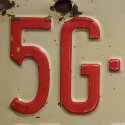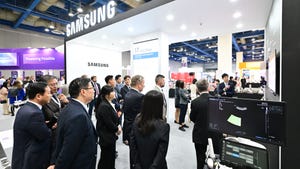
John Legere, the sharp-tongued CEO of T-Mobile US, likes spitting venom at bigger rivals AT&T and Verizon, or "Dumb and Dumber," as he has previously called them. He was at it again in late December, predicting "more AT&T 5G BS" this year and essentially arguing that Verizon's 5G coverage will be as spotty as a teenage face. (See T-Mobile & Sprint: Marriage made in hell.)
So it must have been embarrassing when respondents to a 5G Consumer Index survey sponsored by T-Mobile US Inc. ranked both Dumb and Dumber ahead of Legere's business in the 5G leadership stakes. Indeed, with 16% of votes, Verizon Communications Inc. (NYSE: VZ) beat 17 other named organizations when around 5,000 survey takers were asked which company they believe is the 5G leader today. AT&T Inc. (NYSE: T) garnered 7% of the votes cast, while T-Mobile scooped just 3%.
Figure 1: What One Company Do You Believe is the Leader in 5G Tech Today?  Source: HarrisX, T-Mobile. Notes: 5,009 survey respondents were asked the question, with 27% answering 'don't know.'
Source: HarrisX, T-Mobile. Notes: 5,009 survey respondents were asked the question, with 27% answering 'don't know.'
That is not the kind of detail you want in your press release, and so T-Mobile and HarrisX, the research company that ran the survey, talked up other results instead. Some two in three Americans believe 5G will be a reality by 2020, for instance, and 90% of people aware of 5G think it will be better than 4G.
Those results, however, are clearly less interesting than ones that didn't make it into the press release, but which can be found in a spreadsheet available via the 5G Consumer Index website. With 15% of votes, iPhone maker Apple Inc. (Nasdaq: AAPL) came just behind Verizon in the 5G leadership ranking, even though it appears to have had little involvement in developing 5G technology. Moreover, while the likes of Samsung Electronics Co. Ltd. (Korea: SEC) and Huawei Technologies Co. Ltd. are expected to unveil their first 5G handsets this year, many analysts do not think Apple will produce a 5G iPhone until 2020. (See iPhone Upset Leads to Apple Crumble and Apple Delivers Post-Holiday Turkey, Lowers Revenue Guidance.)
As for network equipment makers Ericsson AB (Nasdaq: ERIC) and Nokia Corp. (NYSE: NOK), which are leading the 5G charge in North America, they barely registered, picking up 13 and 30 votes respectively. That was at least better than device chipmaker Qualcomm Inc. (Nasdaq: QCOM), whose name didn't even feature in the survey.
For all the latest news from the wireless networking and services sector, check out our dedicated mobile content channel here on Light Reading.
Of course, the Average Joe can hardly be expected to know about companies that make arcane contraptions called eNodeBs and use words like "virtualization" in everyday conversation. It makes sense that Nokia was marginally ahead of Ericsson: Older Americans may vaguely recall it once had something to do with handsets and was even linked with Microsoft Corp. (Nasdaq: MSFT). Ericsson might as well be a tenth-century Viking.
Perhaps the most valuable takeaway is that Americans do seem to have an optimistic view of 5G, one that is hard to imagine existing in some other parts of the world. A small majority (51%) of respondents think it will create new job opportunities, and 64% said they were somewhat or very excited about 5G availability. About 55% of survey takers reckon it will enable the development of new technologies, while only a quarter said it would not.
Asking the same questions in Europe, and comparing results across the two regions, would be an interesting experiment. If Americans are the world's go-getters, then Europeans are often accused of being its tired cynics. And while there are hotspots of tech talent and innovation throughout Europe, it already appears to lag the US and parts of Asia in the race to 5G. Regulation typically gets the blame, but operators will be in no hurry to build 5G networks if they assume customers are not desperate to buy 5G phones. That is where a survey could help.
— Iain Morris, International Editor, Light Reading
Read more about:
EuropeAbout the Author(s)
You May Also Like












